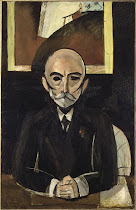-Good and evil are relative. There are no villains in reality.
(A group of children go off to combat a horrible monster who has eaten their parents. They destroy the monster only to be threatened by the monster's tiny infants who swear that when they come of age they will have their revenge. The children discover that they are part of a feud that has lasted hundreds of years. Their parents, grand parents, great grand parents (and so on...) had all killed monsters and were killed by monsters. Are they the generation strong enough to stop the cycle of hate?)
-Everything dies.
(A child loses their pet and goes into depression. Their ghost pet returns with other ghost pets to explain one of my favourite excerpts of Chuang-Tzu's work. Where he is confronted for happily banging on a drum after the death of his wife and he remarks that nature teaches change is constant and he does not wail when the seasons change)
Chuang Tzu's wife died. When Hui Tzu went to convey his condolences, he found Chuang Tzu sitting with his legs sprawled out, pounding on a tub and singing. "You lived with her, she brought up your children and grew old," said Hui Tzu. "It should be enough simply not to weep at her death. But pounding on a tub and singing — this is going too far, isn't it?" Chuang Tzu said, "You're wrong. When she first died, do you think I didn't grieve like anyone else? But I looked back to her beginning and the time before she was born. Not only the time before she was born, but the time before she had a body. Not only the time before she had a body, but the time before she had a spirit. In the midst of the jumble of wonder and mystery a change took place and she had a spirit. Another change and she had a body. Another change and she was born. Now there's been another change and she's dead. It's just like the progression of the four seasons, spring, summer, fall, winter." "Now she's going to lie down peacefully in a vast room. If I were to follow after her bawling and sobbing, it would show that I don't understand anything about fate. So I stopped.
(Chapter 18 of Chuang Tzu's Writings)
-You can be the change that you want to see in the world.
(Loren Eiseley's starfish story. A stranger challenges a child, asking "why are you throwing the starfish back in the ocean? You can not possibly save them all. What difference does it make?" She responds with the classic "it made a difference to that one." Oh, and that stranger's name is Gandhi and he goes on to Free India. Inspiration on 'roids, right? This is a picture of Gandhi dunking on Adolf Hitler for the cover:)

-People will try to cause you pain because they're in pain.
(A story about robots that fill each other with water until they malfunction. So each robot is trying to dump their water into another robot so that they can function. One little robot realizes you don't have to dump out water on other robots. You can release it in other ways, like exercise and meditation. Only now, everyrobot dumps their water/frustrations on this poor little robot until she explains to them that we're all in this together.
-Think for yourself.
(A child always goes along with the crowd but before they do they ask themselves if what the crowd is doing is a good idea. Written in a very simple repetitive style)



2 comments:
I will email that book cover to Meags... I think it's just what she had in mind.
These are thought-provoking stories with valuable lessons.
Post a Comment